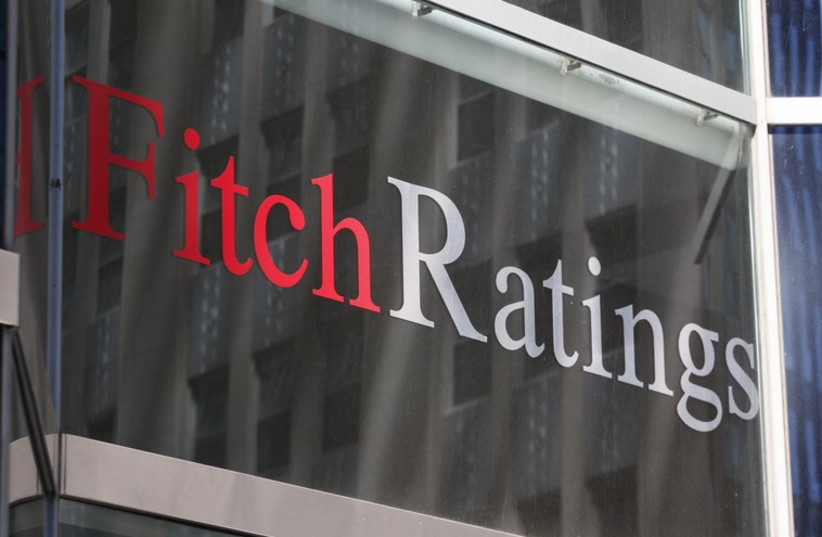Fitch’s score of Israel, which kept the credit rating at A+ while dropping its outlook from stable to negative, can be looked at as a way of weighting the subjective and objective parts of an investment decision, explained EFG Wealth Management Israel CEO Joseph Wolf.
A country’s credit rating, or a sovereign credit rating, is a score based on how the rating company perceives the country’s ability to pay back debt. This rating can give investors an idea of how risky it is to invest in the debt of a particular country (such as buying the bonds of the country). In determining the rating, companies will assess a number of factors impacting a country’s economy and anticipated future events.
The rating, published earlier this month, removed a negative watch on Israel’s score – an indicator that Fitch no longer plans to drop its rating in the near term. This came with the outlook drop, which means that the company may drop Israel’s rating in the slightly longer-term. The company explained this move saying that while the risks of the war remain elevated, risks to Israel’s profile have broadened and will take longer to assess.
“If you are very optimistic, you would look at the absolute credit rating and say, well that is what determines credit spreads, that is what determines whether certain investors can buy the bonds,” said Wolf, adding that the outlook gives investors a way to consider more subjective risk factors. “The outlook is less objective when it comes to financial decisions,” he said, explaining that this is a way for the ratings company to strike the balance between the subjective and objective factors in Israel’s rating.
The rating also seeks to balance the country’s current financial health with the company’s projections for the future, Wolf explained. It’s possible that “part of [the rating] is catch up and part of it is future looking,” Wolf explained.

It’s a way for Fitch to say “we’re comfortable where we are now, but we are tipping our hand that there are perhaps more negative things to think about than we thought about before,” he said.
When evaluating the meaning of a rating, it’s also important to consider whether ratings are forward or backward looking, Wolf explained. And even if they are forward looking, as Fitch’s seemed to be, it is important to note “whether the forward looking concerns are new concerns or concerns that are widely known in the marketplace.”
While the language of the Fitch rating is forward looking, it “touches on points that are very well known by market participants,” said Wolf.
He also touched on the possible ramifications of the rating saying that in the short term, credit ratings impact Israel’s access to capital markets. The success of Israel’s March bond offering, in which it raised a record breaking $8 billion in bond sales, tells us that “Israel still has access to capital markets,” he said.
While the offering took place before the rating, it was after a February rating from Moody’s that dropped Israel from A1 to A2, and an S&P rating in October that affirmed Israel’s AA- rating while dropping its outlook to negative.
Ongoing war makes predictions nearly impossible
When asked if he has any projections for Israel’s markets if the war continues, Wolf emphasized the uncertainty surrounding Israel’s current situation. “I don’t have a crystal ball, we are in uncharted territory in terms of the length of this conflict,” he said, adding that “on an anecdotal level, traffic is back, restaurants are busy, a lot of the reservists who were called up early, even if they know they are going back [to reserves], are back in school or back at work.”
If anybody had the answer to how the war will continue to impact Israel’s economy, “we would be in a different situation and perhaps Fitch wouldn’t have downgraded the country on the outlook side,” added Wolf.
Wolf touched on other aspects of Israel’s economy during the war saying that it is important to look at Israel’s performance in context.
“In the hottest areas I see, you can find distinctions [between performance in Israel’s markets and globally] but I think directionally it would be hard to say that they are very different right now,” he said, touching on cyber and fintech as two examples.
Wolf also said that he hasn’t seen major examples of multinational companies closing Israeli branches. “The companies that come to Israel are using their Israeli talent to solve the hardest and most creative challenges that they have,” he explained. “They are looking at this in a long-term view.”
EFG International is a private banking group that offers banking and asset management services in 40 locations and is headquartered in Zurich. EFG established subsidiary EFG Wealth Management (Israel) Ltd. in September, opening a financial services office in Tel Aviv.
Reuters contributed to this report.
